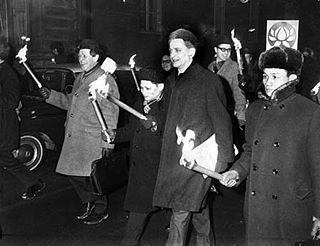 W
WMuhammad Ali was an American professional boxer, activist, entertainer, poet and philanthropist. Nicknamed The Greatest, he is widely regarded as one of the most significant and celebrated sports and cultural figures of the 20th century. He is frequently ranked by many boxing commentators and experts as the greatest heavyweight boxer of all time.
 W
WCarl Dix is a founding member, and a representative, of the Revolutionary Communist Party, USA (RCP). He is a regular contributor to Revolution newspaper and a longtime associate of Bob Avakian.
 W
WJames Mackenzie Fallows is an American writer and journalist. He has been a national correspondent for The Atlantic for many years. His work has also appeared in Slate, The New York Times Magazine, The New York Review of Books, The New Yorker and The American Prospect, among others. He is a former editor of U.S. News & World Report, and as President Jimmy Carter's chief speechwriter for two years was the youngest person ever to hold that job.
 W
WWilliam Ford Gibson is an American-Canadian speculative fiction writer and essayist widely credited with pioneering the science fiction subgenre known as cyberpunk. Beginning his writing career in the late 1970s, his early works were noir, near-future stories that explored the effects of technology, cybernetics, and computer networks on humans—a "combination of lowlife and high tech"—and helped to create an iconography for the information age before the ubiquity of the Internet in the 1990s. Gibson coined the term "cyberspace" for "widespread, interconnected digital technology" in his short story "Burning Chrome" (1982), and later popularized the concept in his acclaimed debut novel Neuromancer (1984). These early works of Gibson's have been credited with "renovating" science fiction literature in the 1980s.
 W
WJim Green was an American-Canadian who was a longshoreman, taxicab driver, community activist, non-profit housing developer, municipal politician, university instructor and development consultant.
 W
WDavid Victor Harris. After becoming an icon in the movement against the Vietnam War, organizing civil disobedience against military conscription and refusing his own orders to report for military duty, for which he was imprisoned for almost two years, Harris went on to a 50 year career as a distinguished journalist and author, reporting national and international stories.
 W
WMichael Hendricks and René Leboeuf are Canadian gay rights advocates. At the height of the AIDS epidemic in the 1980s and 90s, the couple helped lead ACT-UP activists in a fight with the City of Montreal to create a permanent memorial to Quebecers who died of AIDS. After several years trying to stop the grassroots efforts to create the memorial, city officials abandoned their fight in September 1994 and the 'Parc de l'Espoir' was built in the heart of Montreal's gay village.
 W
WTheodore Anthony Nugent is an American singer-songwriter, guitarist and activist. He initially gained fame as the lead guitarist and occasional lead vocalist of The Amboy Dukes, a band formed in 1963 that played psychedelic rock and hard rock. After dissolving the band, he embarked on a solo career. Nugent is known for his Gibson Byrdland, his bluesy and frenzied guitar playing and his energetic live shows. Despite possessing a distinctive, wide-ranging singing voice, Nugent recorded and toured with other lead singers during much of his early solo career, including Derek St. Holmes, Charlie Huhn, Brian Howe and Meat Loaf, only taking on full lead vocal duties later on. His biggest hit was 1977's "Cat Scratch Fever," on which he sang the lead vocals. In the late 1980s and early 1990s, he was part of the supergroup Damn Yankees.
 W
WMark Ivor Satin is an American political theorist, author, and newsletter publisher. He is best known for contributing to the development and dissemination of three political perspectives – neopacifism in the 1960s, New Age politics in the 1970s and 1980s, and radical centrism in the 1990s and 2000s. Satin's work is sometimes seen as building toward a new political ideology, and then it is often labeled "transformational", "post-liberal", or "post-Marxist". One historian calls Satin's writing "post-hip".
 W
WVietnam War resisters in Canada were American draft evaders and military deserters who found refuge from prosecution in Canada. American war resisters who sought refuge in Canada during the Vietnam War would ignite controversy among those seeking to immigrate to Canada. According to scholar Valerie Knowles, draft evaders were typically college-educated and middle class who could no longer defer induction into the Selective Service System. Deserters were usually lower-income and working class who had been inducted into the armed services right after high school or had later volunteered, hoping to obtain a skill and broaden their limited horizons.
 W
WVietnam War resisters in Sweden were Americans who fled to Sweden to avoid service in the Vietnam War between 1967 and 1973. Among the roughly 1,000 American exiles were around 800 military deserters. Unlike other nations like Canada that discretely harbored Vietnam War resisters, the Swedish government granted war resisters asylum status and the public openly welcomed them. This unique acceptance and Swedish politicians' open protests against American involvement in the Vietnam War caused a rift in relations between the United States and Sweden.
 W
WJames Ridout "Jesse" Winchester Jr. was an American-Canadian musician and songwriter. He was born and raised in the southern United States. Opposed to the Vietnam War, he moved to Canada in 1967 to avoid being drafted into the US military while the US engaged in the Vietnam War and began his career as a solo artist. His highest-charting recordings were of his own songs, "Yankee Lady" in 1970 and "Say What" in 1981. He became a Canadian citizen in 1973, gained amnesty in the U.S. in 1977 and resettled in Memphis, Tennessee in 2002.